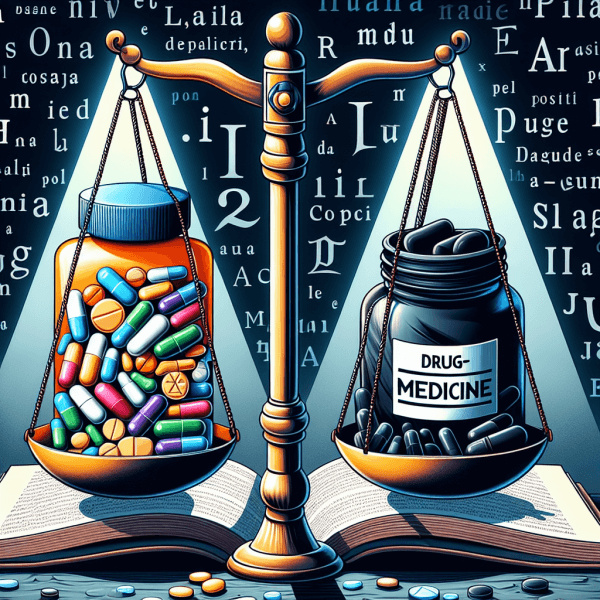The terms 'drug' and 'medicine' are often used interchangeably in everyday conversation, but they possess distinct meanings and implications in scientific and medical contexts. This essay seeks to explore the differences and nuances between these two terms, shedding light on their usage, connotations, and examples.
Definitions and Connotations
Drug
A 'drug' is a broad term that refers to any chemical substance that produces a biological effect when introduced into a living organism. Drugs can be used for various purposes, including recreation, enhancement, or treatment. Importantly, not all drugs are intended for therapeutic use; some can be harmful and are classified as illegal substances.
For example, drugs are categorized based on their effects, legal status, and potential for abuse. Substances like cocaine, heroin, and methamphetamine are classified as illegal drugs due to their high potential for abuse and addiction.
Example Usage of 'Drug': "The new drug developed by the pharmaceutical company is expected to revolutionize cancer treatment, but it's currently undergoing clinical trials to assess its safety."
Medicine
'Medicine,' in contrast, refers specifically to drugs or preparations used for diagnosis, treatment, or prevention of diseases and medical conditions. It implies a purpose aligned with health benefits and is often associated with care administered under the guidance of medical professionals. Medicines are usually regulated by health authorities and are subjected to rigorous testing to establish their efficacy and safety.
Example Usage of 'Medicine': "After reviewing the patient's symptoms, the doctor prescribed a medicine to help alleviate her pain and improve her quality of life."
Regulation and Classification
Regulatory frameworks play a crucial role in the distinction between drugs and medicine. Regulatory agencies such as the Food and Drug Administration (FDA) in the United States oversee the development, approval, and monitoring of drugs intended for medical use. They set criteria that must be met before a drug can be classified as a medicine, ensuring that it serves a legitimate medical purpose and is deemed safe for public consumption.
For example, over-the-counter (OTC) drugs like ibuprofen and acetaminophen can be classified as medicines because they are formulated and recognized for their therapeutic effects, and they can be safely purchased without a prescription.

Cultural Perceptions
Culturally, the terms 'drug' and 'medicine' also carry different connotations. 'Drug' may evoke negative imagery, often associated with addiction or harmful side effects, whereas 'medicine' is seen in a more positive light, linked to healing and wellness. This differentiation can affect public perception, healthcare policy, and even the practice of medicine itself.
Example of Cultural Perception: "While many view medications for mental health as vital supports, some individuals still carry a stigma around taking drugs to manage these conditions."
Conclusion
In summary, while 'drug' and 'medicine' may seem synonymous at first glance, they encompass vastly different meanings in practice. 'Drugs' refer broadly to chemical substances, potentially harmful or beneficial, while 'medicine' specifically denotes substances with the intention of promoting health and well-being. Understanding these distinctions is vital for effective communication within the fields of linguistics, healthcare, and pharmacology.








Have a discussion about this article with the community:
Report Comment
We're doing our best to make sure our content is useful, accurate and safe.
If by any chance you spot an inappropriate comment while navigating through our website please use this form to let us know, and we'll take care of it shortly.
Attachment
You need to be logged in to favorite.
Log In